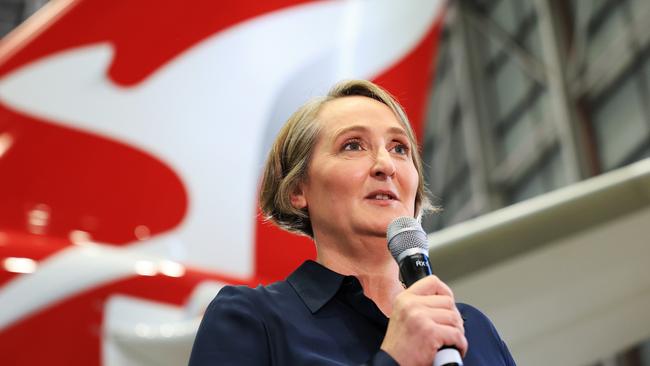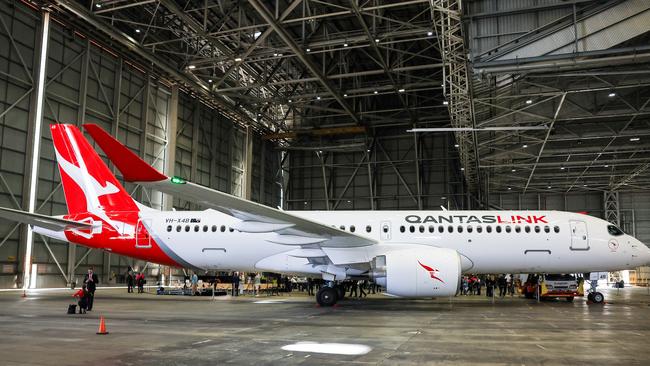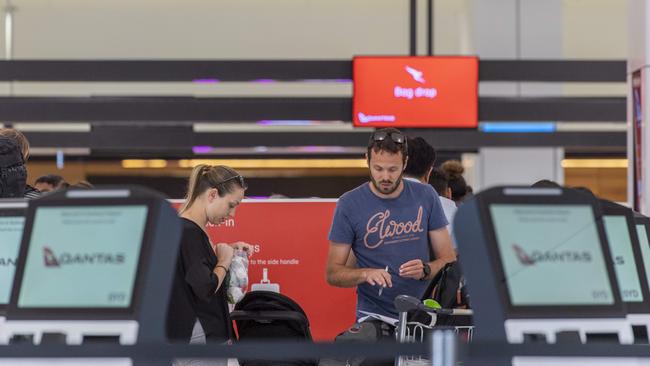
Former long-serving boss Alan Joyce was able to stare down strikes, airport operators, lost baggage and even the Covid pandemic — but the one thing that eventually unseated him was the competition regulator’s landmark claim over so-called “ghost flights” that alleged that tens of thousands of passengers were sold flights that didn’t exist.
It was a landmark legal action that went to the heart of passenger rights and fuelled suspicions around how Joyce was running the airline: shareholders first, second and third — then customers a distant fourth.
Over the weekend, Qantas and the Australian Competition and Consumer Commission agreed to an undertaking that will see the airline pay $100m in penalties and refund affected customers $20m. The $120m agreement will still need to be approved by the court, but for Qantas it avoids a distracting and likely damaging case unfolding in public.

The settlement allows Hudson to draw a line under one of the biggest distractions hanging over the airline. Next to come is the compensation payments to baggage handlers found to have been unlawfully sacked. Hudson, who has been deeply involved, says mediation is progressing and has returned to court and a resolution could be weeks away.
But an agreed outcome on the “ghost flights” case represents a big win for ACCC chair Gina Cass-Gottlieb, marking one of the competition watchdog’s largest fines — although last year’s $438m in penalties against training school Phoenix Institute still holds the record.
Importantly, the legal action sets the benchmark for expectations around misleading conduct as more and more activity between business and consumers takes place online.
In its undertaking, Qantas acknowledged that selling flights that had been cancelled was false and misleading.
Qantas has long argued the cancellations were part of the chaotic restart coming out of the Covid pandemic, and built its defence around the notion that airlines can’t guarantee specific flight times and options when first booked.
The fact that customers were rebooked on other flights or offered a refund was an important win for Qantas because it meant the regulator dropped the second key leg of its legal action of “fees for no service”. This was a key concession from the regulator. If the claims had been stacked up this would have represented a substantially more costly fine and hit to the airline’s reputation.
Hudson says Qantas “would never take” fees from a customer and not deliver them a flight or provide a refund in the event of a cancellation that can’t be rebooked.
Essentially, the legal agreement struck with the ACCC down to how the airline communicated the cancelled flights to passengers, and it wasn’t quick enough to remove impacted flights from sale on the website. Hudson says the case offered a chance to take a deep dive into how flights are sold online, and the airline has now overhauled its processes when a flight is cancelled, including automatically pulling it from the website.
Back to customers
The new chief executive was personally involved in the negotiations with the ACCC, and the settlement — albeit a big hit to earnings — represents a key moment.
The settlement allows Hudson to put the focus back onto customers, with Qantas admitting it went wrong and agreeing to fix it. Importantly, Hudson on Monday apologised for the inconvenience to passengers, a big acknowledgment of the personal impact on tens of thousands of people.
“We didn’t get everything right,” Hudson said on Monday.

The agreement comes after a busy eight months for the Qantas boss, with the arrival of a fleet of high-tech A220 aircraft to boost domestic capacity and a long-awaited revamp of the Frequent Flyer scheme. At the same time she has revamped her top management team.
The settlement also points to a different approach at the top. In days gone by, a more pugnacious Qantas has been prepared to fight cases all the way where it believes that it is in the right.
Even with the issue boiling down to poor communication, it is very likely the Qantas management in the past would have taken on the regulator. But Hudson’s approach sends an important message about the airline’s priorities under her management and reset board.
Indeed Qantas made a grave error of judgement in trying to fight a case on sacked baggage handlers to the High Court. It lost badly last year and this was another blow on reputation. Now, Hudson has invested significant time in trying to negotiate an outcome, with compensation likely to be bigger that what the airline would have faced had it taken a different path with the 1700 sacked workers.
Piece by piece, Hudson is checking off the management mistakes of the past. This will eventually give her airline clear air to focus flying Australians around again.
johnstone@theaustralian.com.au




Qantas boss Vanessa Hudson has taken another big step forward in putting the airline’s horror year behind it, as she closes off one of the biggest reputational hits holding back efforts to win over customers.